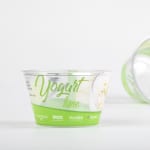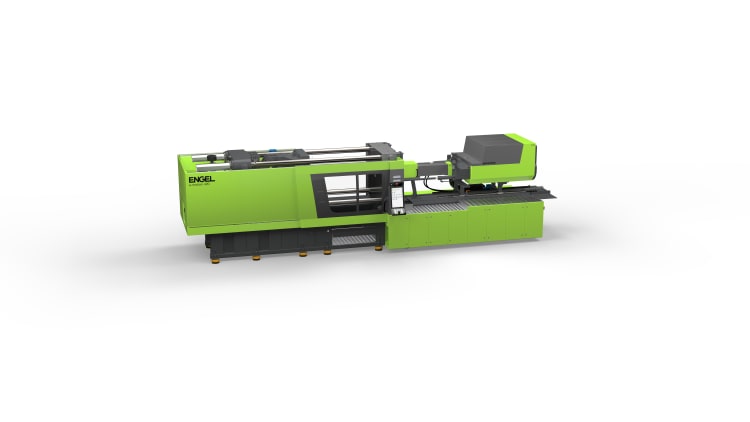
ENGEL will demonstrate an integrated, all-electric production cell for thin-wall yoghurt cups made of PET at K 2025. The application combines in-mould labelling with 30% bottle-grade rPET in a food-contact blend and is targeted at a global brand owner focusing on sustainability. The parts already align with the 2030 targets of the Packaging and Packaging Waste Regulation, and the cups are fully recyclable. At the core of the cell is an all-electric e-motion 420 injection moulding machine with 4200 kN clamping force, paired with a stack mould from Plastisud. ENGEL applies injection-compression moulding to achieve high-performance thin-wall processing of PET in an energy-efficient and material-saving way at production scale.
The material concept uses 70% virgin PET from Novapet and 30% rPET regranulate from NGR, processed via liquid-state polycondensation to meet food-contact requirements. Polytainers, headquartered in Toronto, is responsible for manufacturing the cups, drawing on its design and moulding expertise. The setup illustrates an end-to-end circular approach, from cup production and material preparation to the subsequent recycling step executed by NGR. The solution also integrates IML labels designed for separation during recycling, supporting the production of pure, dye-free rPET.

Recyclable, lightweight and future-proof: These thin-wall PET yoghurt cups with 30% bottle-grade rPET already meet the 2030 requirements of the PPWR and demonstrate how sustainability and product quality go hand in hand in injection moulding.
In production, the all-electric e-motion 420 produces twelve cups per cycle, each weighing ten grams, in five seconds. The result underlines that bottle-grade rPET can be processed electrically even in demanding thin-wall scenarios, combining efficiency with precision while maintaining part quality. The demonstration covers the full cell, including a 6+6 stack mould, IML and downstream automation for inspection, reject management and packing.
All-electric high-performance moulding
The newly developed 2465 high-performance injection unit increases injection speed to 500 mm/s, almost 67% faster than standard solutions. ENGEL has also raised overall system dynamics, which enables the all-electric processing window for this PET application and shortens cycle times. A dosing drive with a screw circumferential speed of 1 m/s, together with a PET-optimised screw, supports gentle melt preparation and homogeneous plasticising under high-throughput conditions. Improved accessibility simplifies maintenance and servicing, contributing to overall equipment effectiveness.

Scalable solution for series production: At K 2025, the all-electric ENGEL e-motion 420 demonstrates how demanding thin-wall applications with rPET can be realised at production scale – energy-efficient, precise and cost-effective
Process control and tooling
The iQ weight control plus assistance system analyses the injection process in real time and automatically adjusts the switchover point and holding pressure for every shot. Depending on settings, it can operate in speed- or pressure-controlled modes, using two input values. In parallel, iQ motion control optimises clamping-side movements and reduces dry cycle time by up to 12%, supporting cost efficiency.
Together with Plastisud, ENGEL presents an industrially scalable solution based on an innovative 6+6 stack mould. The tool injects synchronously via an extended hot runner system into the central mould plate. Injection-compression plays a central role: the melt is injected into a slightly open mould that closes while injection is still in progress. This reduces the required injection pressure and speed, minimises shear stress and protects the PET, enabling a stable process on an all-electric platform while achieving uniform thin-wall structures and high part quality.
Automation and labelling
The IML system from Pagés places labels, removes finished parts, performs inline inspection, separates rejects and packs good cups into cartons. The NextCycle PET IML labels from MCC Verstraete are designed for separation by an air stream during recycling, facilitating the production of pure, dye-free rPET. A corresponding recycling example will be shown at the NGR stand.
With this setup, ENGEL demonstrates that thin-wall injection moulding of bottle-grade rPET can be realised in an all-electric, energy-efficient and material-saving way. The cell is close to series production and fully scaled for industrial use, combining stack moulding, in-mould labelling and complete automation. The exhibit will run at K 2025 in Düsseldorf, Hall 15, Stand B42 and C58.




